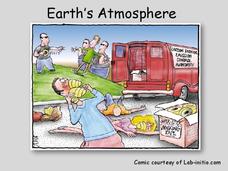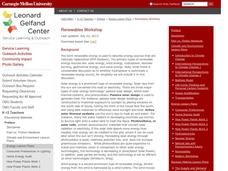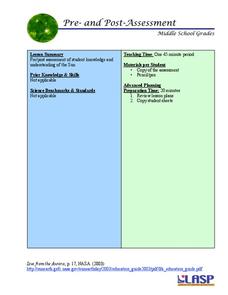NASA
Taking a Cold, Clear Look at the Universe
Take a look with another perspective. Pupils read to find out what portion of the electromagnetic spectrum a space telescope sees and the difficulties of viewing infrared radiation from other objects in space. Individuals discover how...
Science Geek
Earth's Atmosphere
Ozone gas absorbs the harmful UV-B rays and helps protect humans. An informative presentation begins with the layers of the earth's atmosphere, the pressure and temperature in each of the layers, the ozone layer, the ozone cycle, and the...
Carnegie Mellon University
Renewables Workshop
Youngsters examine resource maps to find out which states are using solar and wind power and discuss as a class various other renewable energy sources. They use a provided data table to record pros and cons to each technology, build and...
PHET
Band Structure
Electricity travels at the speed of light, 186,000 miles per second. Through a simulation, classes see how the structure of energy bands in crystals of atoms determines how materials conduct electricity. Participants can change the...
Curated OER
Exploring Solar Beads
Learners discover solar energy beads and learn about ultraviolet light. In this solar energy lesson, students learn about solar energy beads, ultraviolet light, and UV radiation dangers. Learners experiment with the beads to identify.
Curated OER
Ears and Hearing
Students explore vibrations and sound waves. In this lesson about hearing, students use experiments to determine how sound waves travel. Students use a saucepan, rice, and a plastic cover for one experiment and a tube, plastic wrap, a...
Curated OER
Energy Defined
Fourth graders complete activities to study the sources of energy and forms. In this energy lesson, 4th graders discuss the origin of energy and define it. Students participate in several experiments to further study energy including a...
Curated OER
Exploring Infrared Image Technology
Learners investigate the formation of infrared images. In this physics lesson, students discuss the different application of infrared imaging technology. They compare this to images formed by visible light.
Curated OER
Let the Sunshine in
Students collect and analyze data to study wavelengths of visible light. They cover Styrofoam cups with three different colors of sun filtering products and shine a lamp directly on the cups. They determine the most effective filtering...
Curated OER
Riding the Gravity Wave
Students write a sketch of an artist or athlete that has pushed the limits on gravity. They explore concepts of rhythm, balance and friction. They examine how engineers design sports equipment.
Curated OER
Frozen Film
Students discover how light reflects off surfaces. For this hands-on demonstration, students examine how variations in color are produced by light interference.
Curated OER
Earth's Winds, Crust, and Atmosphere
This site provides a variety of activities and worksheets about the problem-based learning activity about Earth and its atmosphere. The lessons can be used separately or together in a geology unit. The resources and charts are very...
Curated OER
Looking at the World in a Different Light Quiz
Students participate in a quiz about light, colors and wavelength. In this investigative instructional activity students use the Internet to take a quiz on light.
Curated OER
Making Waves, Making Music, Making Noise
Sixth graders watch a demonstration on how talking cans produce sounds. In groups, they compare and contrast the sounds from different sized cans. They participate in a variety of activities to discover how sounds are made and how...
Curated OER
The Invisible Zoo
Students differentiate cold and warm-blooded animals using infrared images. For this physics lesson, students compare the images formed by infrared and visible light. They explain how scientists use infrared technology to study animals.
Curated OER
Super Gelatin
Students investigate the refraction properties of gelatin to calculate its index of refraction. They discover that as the light travels through the gelatin, its speed and wavelength also change. Students find th indes of refraction of an...
PHET
The Sun: Pre- and Post-Assessment
Want to see how far pupils have come since the beginning of the unit? This activity is designed to be a pre- and post-assessment for a unit on the Sun. The first in a series of 18 that can be combined to form a complete unit. Two...
Exploratorium
Bubble Tray
Create jumbo bubbles and use them to teach about surface tension or interference, perfect for a physical science lesson on light or molecular attraction.
Curated OER
Electromagnetic Spectrum
Learners define electromagnetic radiation, list major categories and uses of electromagnetic waves, identify potential health risks with electromagnetic waves, and demonstrate understanding of Plank's constant by solving quantitative...
Curated OER
The Virtual Electron Microscope
Young scholars explore the world of the very small using a Flash plug-in Virtual Electron Microscope. They complete and discuss an activity in which unknown samples are placed under the computer simulated microscope to determine where...
Curated OER
Lesson- Colors of Stars
Student describes what happens to the color of a stove burner or a coal as it gets hotter. They use the applet to determine what range of temperatures range give you a red light, what range of temperatures would give you a white light,...
Teach Engineering
The Amazing Aerogel
Introducing ... the aerogel. The first of a two-installment series teaches young engineers about the properties and uses of aerogels. A PowerPoint presentation provides information about this unique material to help solidify the concept.
Curated OER
Shrinky Dinks® Palettes
Here is a fun and clever lesson for teaching physics classes how to calculate wavelength if given the energy and frequency data. On a worksheet, they compute wavelengths using a table of information that you provide. On a paper palette,...
Curated OER
Frozen Film
Students are introduced to the topic of light interference through this hands-on activity. They observe how light reflects off two surfaces and then meets to form an interesting variation of color on a film surface.

























